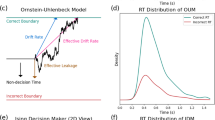Abstract
When making a choice, people like to have options, but an emerging literature on “choice overload” suggests that the provision of too many options results in adverse experiences, including a depletion of cognitive resources and postdecision feelings of regret. A strong implication is that individuals should shy away from situations involving too many options. The present study examined whether this expression of choice overload would emerge when human services workers confronted hypothetical scenarios involving choices of treatment strategies. On different trials, the participants indicated preference for single-option, limited-options, and extensive-options scenarios, wherein the number of extensive-options alternatives geometrically increased across successive trials. In general, preference for extensive-options scenarios decreased with the number of options that they incorporated. Preference for extensive options was well described by a negatively decelerating, hyperbolic-like function that typically is employed in studies of discounting. Moreover, as expected based on the choice overload framework, participants who were categorized as “maximizers” using the Maximization and Regret Scales demonstrated lower discounting (i.e., lower k value) than those categorized as “satisficers.” We discuss how a quantitative discounting framework may be fruitfully applied to advance the study of choice overload.
Similar content being viewed by others
References
CRITCHFIELD, T. S., & REED, D. D. (2009). What are we doing when we translate from quantitative models? The Behavior Analyst, 32, 339–362.
DAR-NIMROD, I., RAWN, C. D., LEHMAN, D. R., & SCHWARTZ, B. (2009). The maximization paradox: The costs of seeking alternatives. Personality and Individual Differences, 46, 631–635. doi:10.1016/j.paid.2009.01.007
FISHER, W. W., & MAZUR, J. E. (1997). Basic and applied research on choice responding. Journal of Applied Behavior Analysis, 30, 387–410.
GREEN, L., & MYERSON, J. (2010). Experimental and correlational analyses of delay and probability discounting. In G. J. Madden and W. K. Bickel (Eds.), Impulsivity: The behavioral and neurological science of discounting (pp. 67–92). Washington, DC: American Psychological Association. doi:10.1037/12069-000
GROSSBARD, C. L., & MAZUR, J. E. (1986). A comparison of delays and ratio requirements in self-control choice. Journal of the Experimental Analysis of behavior, 45, 305–315. doi:10.1901/jeab.1986.45–305
HOLT, D. D., GREEN, L., MYERSON, J., & ESTLE, S. J. (2008). Preference reversals with losses. Psychonomic Bulletin & Review, 15, 89–95. doi:10.3758/Pbr.15.1.89
IYENGAR, S. S., & LEPPER, M. R. (2000). When choice is demotivating: Can one desire too much of a good thing? Personality Processes and Individual Differences, 79, 995–1006. doi:10.1037//0022-3514.79.6.995
IYENGAR, S. S., WELLS, R. E., & SCHWARTZ, B. (2006). Doing better but feeling worse: Looking for the “best” job undermines satisfaction. Association for Psychological Science, 17, 143–150. doi:10.1111/j.1467–9280.2006.01677.x
MADDEN, G. J., & BICKEL, W. K. (Eds.). (2010). Impulsivity: The behavioral and neurological science of discounting. Washington, DC: American Psychological Association. doi:10.1037/12069–000
MADDEN, G. J., & JOHNSON, P. S. (2010). A delay discounting primer. In G. J. Madden and W. K. Bickel (Eds.), Impulsivity: The behavioral and neurological science of discounting (pp. 1–37). Washington, DC: American Psychological Association. doi:10.1037/12069–000
MAZUR, J. E. (2006). Mathematical models and the experimental analysis of behavior. Journal of the Experimental Analysis of behavior, 85, 275–291. doi:10.1901/jeab.2006.65-05
MCKERCHAR, T. L., GREEN, L., & MYERSON, J. (2010). On the scaling interpretation of exponents in hyperboloid models of delay and probability discounting. Behavioural Processes, 84, 440–444. doi:10.1016/j.beproc.2010.01.003
MCKERCHAR, T. L., GREEN, L., MYERSON, J., PICKFORD, T. S., HILL, J. C., STOUT, S. C. (2009). Acomparison of four models of delay discounting in humans. Behavioural Processes, 81, 256–259. doi:10.1016/j.beproc.2008.12.017
MOTULSKY, H., & CHRISTOPOULOS, A. (2004). Fitting models to biological data using linear and nonlinear regression: A practical guide to curve fitting. New York: Oxford University Press.
MYERSON, J., & GREEN, L. (1995). Discounting of delayed rewards: Models of individual choice. Journal of the Experimental Analysis of behavior, 64, 263–276. doi:10.1901/jeab.1995.64-263
SCHEIBEHENNE, B., GREIFENEDER, R., & TODD, P. M. (2010). What moderates the too-much-choice effect? Psychology & Marketing, 26, 229–253. doi:10.1002/mar.20271
SCHWARTZ, B. (2000). Self-determination: The tyranny of freedom. American Psychologist, 55, 79–88. doi:10.1037/0003-066X.55.1.79
SCHWARTZ, B. (2004a). The paradox of choice: Why more is less. New York: HarperCollins.
SCHWARTZ, B. (2004b, April). The tyranny of choice. Scientific American, 71–75. Retrieved from http://www.sicam.com.
SCHWARTZ, B., WARD, A., MONTEROSSO, J., LYUBOMIRSKY, S., WHITE, K., & LEHMAN, D. R. (2002). Maximizing versus satisficing: Happiness is a matter of choice. Journal of Personality and Social Psychology, 83, 1178–1197. doi:10.1037/0022-3514.83.5.1178
SUGIWAKA, H., & OKOUCHI, H. (2004). Reformative self-control and discounting of reward value by delay or effort. Japanese Psychological Research, 46, 1–9. doi:10.1111/j.1468-5884.2004.00231.x
VOHS, K. D., BAUMEISTER, R. F., SCHMEICHEL, B. J., TWENGE, J. M., NELSON, N. M., & TICE, D. M. (2008). Making choices impairs subsequent self-control: A limited-resource account of decision making, self-regulation, and active initiative. Journal of Personality and Social Psychology, 94, 883–898. doi:10.1037/0022-3514.94.5.883
WILDE, L. L. (1987). Consumer behavior under imperfect information: A review of psychological and marketing research as it relates to economic theory. In L. Green and J. H. Kagel (Eds.), Advances in behavioral economics (Vol. 1, pp. 219–248). Norwood, NJ: Ablex.
WIECZORKOWSKA, G., & BURNSTEIN, E. (1999). Adapting to the transition from socialism to capitalism in Poland: The role of screening strategies in social change. Psychological Science, 10, 98–105. doi:10.1111/1467-9280.00115
Author information
Authors and Affiliations
Corresponding author
Rights and permissions
About this article
Cite this article
Reed, D.D., Reed, F.D.D., Chok, J. et al. The “Tyranny of Choice”: Choice Overload as a Possible Instance of Effort Discounting. Psychol Rec 61, 547–560 (2011). https://doi.org/10.1007/BF03395776
Published:
Issue Date:
DOI: https://doi.org/10.1007/BF03395776




